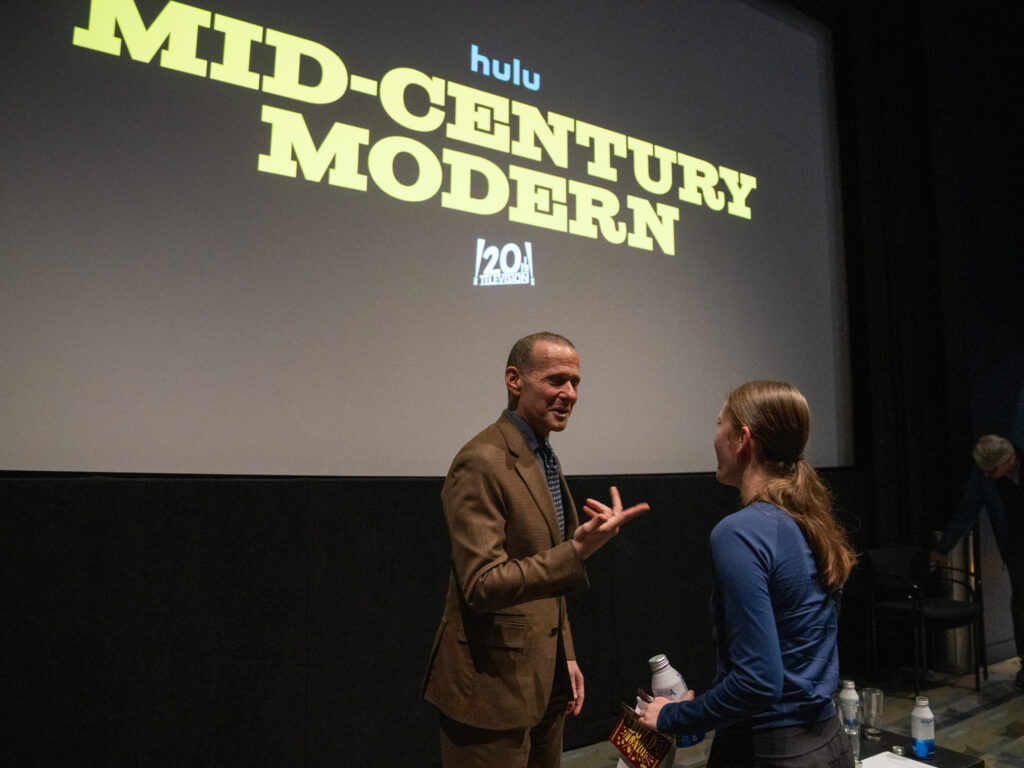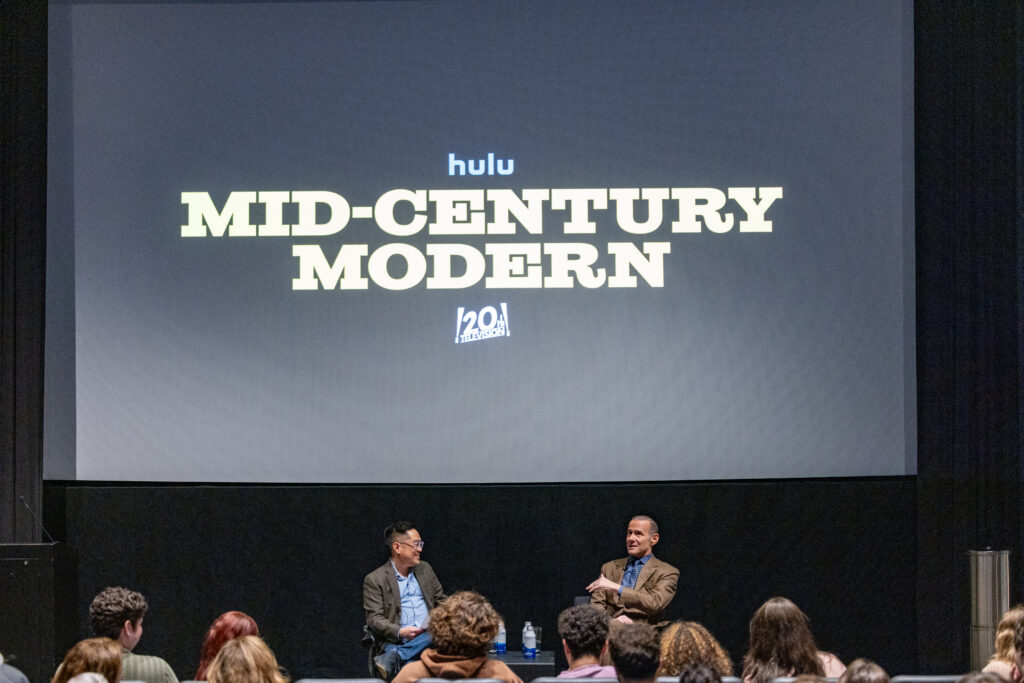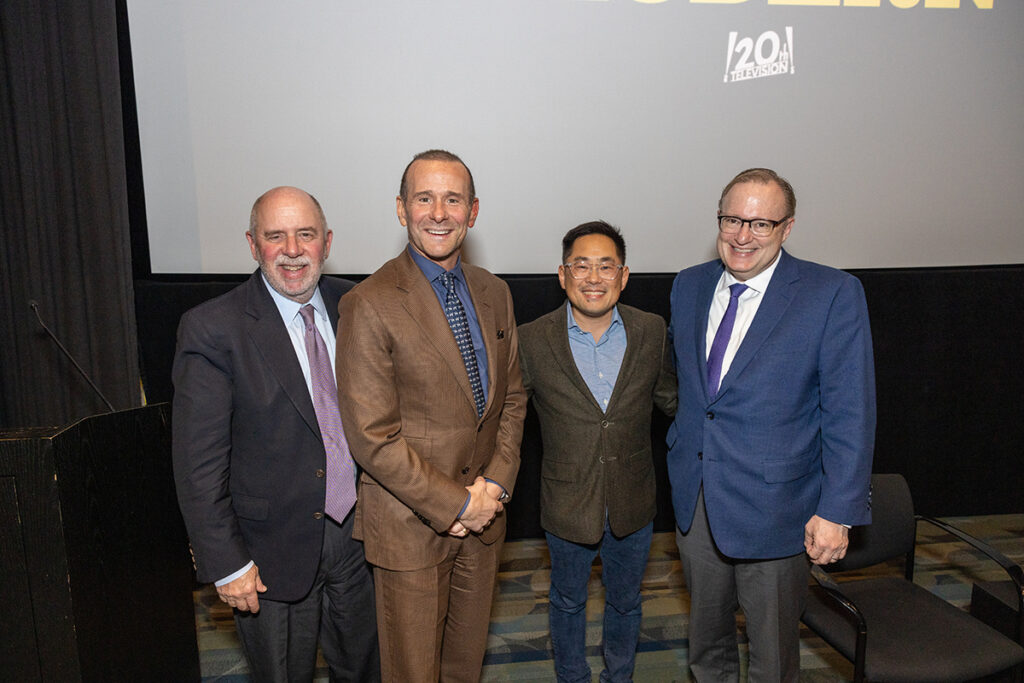Mutchnick ’87 on Changing Culture, Getting Shows Made at Screening of ‘Mid-Century Modern’

Former President Joe Biden said that Emerson Trustee Max Mutchnick’s hit show Will & Grace did more to educate the American public about the country’s changing social values than anyone had ever done before.
Emerson College Board President Eric Alexander ’78 recalled Biden’s comments before two episodes of Mutchnik’s new hit show, Mid-Century Modern, which is #1 on Hulu this week, were screened in the Bright Family Screening Room on Monday night.
“People fear what’s different, now they’re beginning to understand…that’s the Emerson mission,” said Alexander.
The event was open to the Emerson community, and the room was filled with staff, faculty, and students eager to ask Mutchnick ‘87 questions after an insightful Q&A led by Visual & Media Arts Associate Professor Ed Lee.

Mid-Century Modern, starring Nathan Lane, Matt Bomer, Nathan Lee Graham, and the late Linda Lavin, follows three gay men who retire together to Palm Springs.
Lee asked Mutchnick to talk about how Mid-Century Modern came to fruition. Mutchnick said he and his co-creator, David Kohan, came up with a version of the show 10 years ago, and it was resoundingly rejected by studio executives.
“I never let it go because there was something to it,” said Mutchnick. “…and then I found an easy way to get the idea across – it was to say it’s gay Golden Girls…I could go into any room or studio on any platform and they’d understand that.”
After writing the script during the pandemic, Mutchnick met with producer Ryan Murphy, who, after hearing the premise, wanted in. Mutchnick said the script was written for a Nathan Lane-type.
“That day [Ryan Murphy] gave it to Nathan Lane, and we had a deal in 12 hours,” said Mutchnick.
Mutchnick never let go of the premise because he felt there was something to it.
“You know [a pitch that’s going to sell] when you know it…” said Mutchnick. “It’s a matter of who you are pitching to…if you’re pitching to an executive at that moment who wants the thing that you’re writing. If it fits a theme they’re looking for. I do feel, to be honest, this would be a hard thing to say no to. Saying no to three older gay guys is hard.”
Lee asked about what goes into writing a successful pilot episode. He and Mutchnick agreed it’s the hardest episode to write for a TV series.
“The hardest thing about writing a pilot, is making it so voices are tight right away. That’s very hard,” Mutchnick said. “In the first four pages, you have to explain the story you’re telling, and explain who the leads are, and what they’re going to represent. The dumb one, the bitchy one, the smart one, the leader. Get it out as fast as it can get out, but still have an organic pace. What you saw in the pilot is the four pages that sold the show, but we wrote seven pages and then you take out the fat.”
One line in particular that caught Lee’s eye during the pilot was when a character spoke about “surviving the ‘80s.” Mutchnick said he a lot of guilt around the fact that through 11 seasons of Will & Grace, they never said the word “AIDS”.
“I was just trying so hard to get a gay guy on TV to play a gay guy on TV,” said Mutchnick. “I didn’t want to offend right away. I wanted people to accept it first. I wrote to win.”

When asked about the impact that Emerson had on him, Mutchnick talked about the school’s ethos.
“There’s something in the water here…I came here with it. There’s something about being around this healthy competition that I absolutely thrived on,” said Mutchnick. “I like that people said they could do a show better than me, or make a short film better than me. I like being a student. I saw the upper classmen doing things I wanted to do.”
Categories